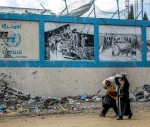You are here
Towards more coordination and consolidation
Apr 23,2014 - Last updated at Apr 23,2014
In January this year I headed the Jordanian delegation to the Second International Humanitarian Pledging Conference for Syria in Kuwait, where the United Nations appealed to donors for $6.5 billion — the largest amount ever requested for a single humanitarian emergency.
To date, however, only $1.45 billion has been committed.
While the full total of these funds is undisputedly required, so too is a reconsideration of the channels through which the bulk of committed financing currently flows.
As in all crises followed by a generous outpouring flow of aid, it is usually an overwhelming challenge for the host government to coordinate these funds effectively. In this case, not only is the government of Jordan leading the overall response to the impact of the Syria crisis within the country, it has also established administrative and public finance capacity. Yet the bulk of aid flow is failing to be directed through national government systems.
Last year, over $735 million was channelled through the Syria Regional Response Plan towards supporting Syrian refugees in Jordan.
While such funds are critical to provide life-saving assistance and address the urgent needs of recently arrived refugees, the impact of the crisis extends far beyond the scope of an exclusively humanitarian response.
Today, nearly 80 per cent of the Syrian refugees in Jordan do not reside in camps, but in communities where they rely on government subsidies and services.
The mandate and reach of conventional humanitarian agencies simply does not encompass the range of issues which have arisen as a result of hosting such a vast number of refugees in what were already some of the poorest parts of the country.
At the same time as the crisis has exacerbated vulnerabilities for the poorest segments of the population, especially in the countries hosting the largest numbers of Syrian refugees, and begun eroding access to quality public services, it has increased pressure on public finance, worsened the trade deficit and caused losses to key economic sectors.
In order to sustain adequate levels of service to the combined refugee and hosting populations, there is a pressing need to alleviate the strain on national and local institutions and budgets.
Financing such investments now is critical not only to enable national systems to cope and prevent further deterioration of service levels, but also to build national and local capacity to scale-up and sustain recovery efforts into the future.
Addressing these broader socio-economic and political impacts of the crisis requires government leadership.
It is almost universally acknowledged that supporting national ownership of development strategies, such as the government’s recently developed National Resilience Plan (NRP) — the principal policy and programmatic response of the government of Jordan to the impact of the Syria crisis on host communities — is the most appropriate response for donors and the international community. This also includes the alignment of development assistance to national priorities, harmonisation of development efforts and agreement on arrangements for mutual accountability, all of which contributes to better and more sustainable development outcomes.
Towards these aims, the government has sought to create a more open, engaging and enabling environment with its key partners.
In addition to fostering a participatory approach to the development of the NRP, the government maintains a flexible aid architecture with various modalities of aid flow designed to make donor support to the NRP as versatile as possible.
The creation of parallel systems and structures for the delivery of aid and services undermines both aid coordination and effectiveness. For the public to see non-Jordanian agencies being empowered and operated as the primary providers of assistance, be it to Jordanians or Syrians, negatively affects public perception of the government, erodes trust, and depletes the vitality of the social contract between the state and its citizens, especially where national institutional capacity exists to perform these functions.
As the crisis enters its fourth year, the need for increased burden sharing by the international community and better coordination of responses to mitigate its impacts is great.
Support for national efforts to address the effect of the crisis is critical to maintaining the provision of basic services, protecting local livelihoods and safeguarding regional stability.
The writer is minister of planning and international cooperation. He contributed this article to The Jordan Times.












